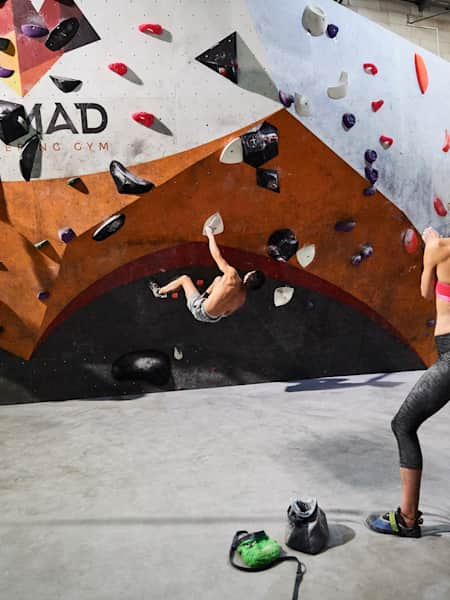1. Use your legs
“They are much stronger than your arms,” says Shauna, who is one of only four women ever to have climbed an 8B+ graded route. “Think about using your feet and standing up using your legs, not just pulling with your arms.”
2. Pretend the holds are made of fragile glass
“A weird tip, I know, but this forces you to slow down, consider your movements, and place your hands and feet delicately,” says Bouldering Coach Louis Parkinson, MD at Catalyst Climbing and a former GB Bouldering World Cup competitor. “With practice, this leads to a graceful and precise climbing style.”
3. Buy shoes from a specialist shop
Daniel Waters is the Centre Manager at Climbing Works in Sheffield – a legendary bouldering hub with National Performance Centre status. When buying shoes, he recommends talking to staff in a specialist shop, rather than going online: “Buying your first shoes without having them fitted could leave you with the wrong size or style, especially if you buy top end performance shoes in an online sale.”
4. Ask others for advice
“A friendly bunch that’s happy to help, most climbers are more about self-improvement than competing,” says Louis. “If you need advice to crack a certain project, or if it’s your first time and you have no idea what’s going on, just find someone who knows what they’re doing and ask away.”
5. Vary your climbing partners
“It's always fun climbing with people at a similar level but it can be great for your technique to climb with more experienced people, even if they're working on different problems to you,” says Daniel.
6. Try everything
According to Shauna, if you want to improve, you need to try everything. “Climb on lots of different angles, and don't be afraid of the steep stuff. Get involved and be sure to try the things you don't think you'll be good at.”
7. Don't start serious training too early
Daniel flags up the importance of progressing safely: “You'll see other climbers using training aids like the campus board and fingerboards, but it takes time to build up a solid fitness base to use these without risking injury,” he says. “For advanced training, it's worth seeking advice from a professional coach to make sure you're doing it safely.”
8. Don't be afraid to fail
Shauna knows more than anyone how important it is to overcome the fear of failure. “Falling and failing are as much a part of climbing as getting to the top,” she advises. “If you're not falling, you're not trying hard enough.”
9. Work your weaknesses
Daniel suggests focusing on the things you find hardest: “If you struggle with certain angles or hold types then structure some of your climbing sessions to focus on this – it'll be tough at first, but you should improve quickly.”
10. Don’t take it too seriously
However hard you work, improvements can sometimes be small and sparse, which can be frustrating. To get past this, Louis suggests taking a step back. “Remember why you started – it’s just for fun! Enjoy yourself, be patient, and the progress will come.”




